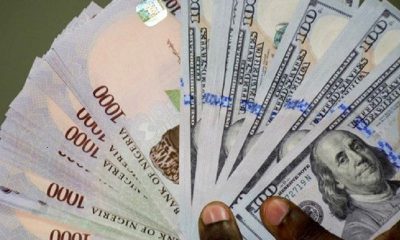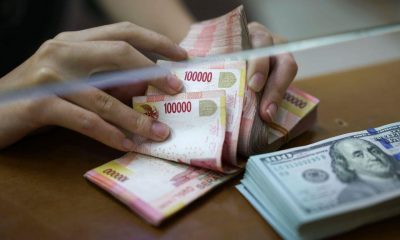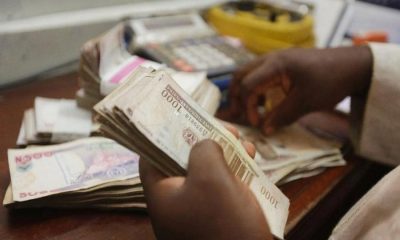Economy
CBN Faces More FOREX Crisis As Naira Drops By 40%

By Dipo Olowookere
The Nigerian foreign exchange market has in recent times been facing challenges as the naira has lost close to 40 per cent in 18 months.
Specifically, the naira has lost so much of its value on the streets even as the gap between the official exchange rate and the parallel market has continued to widen beyond control.
Between December 2014 and June 2016, the value of the naira depreciated by nearly 40 per cent at the Central Bank of Nigeria (CBN) window from N165 to the dollar which it was, at the end of December 2014.
The depreciation at the parallel market has been more alarming.
Yet, the pressure on the foreign exchange market is not being helped by the declining value of Nigeria’s major source of foreign exchange, oil, at the international market.
The price of crude has been yo-yoing, thereby impacting heavily on Nigeria’s revenue and foreign exchange reserve, which has so far declined by 18.6 per cent to $28.06 billion from the $34.46 billion it was at the beginning of 2015.
In trying to stem the problem posed by the foreign exchange challenge, the CBN has chosen the path of capital control by embarking on measures to reduce the rate of foreign exchange outflow from the reserves.
One, CBN has exempted 41 items from the list of eligible items for foreign exchange, and closed the retail Dutch Auction System (rDAS) in favour of an order-based system.
It has also reduced daily and annual limits on naira cards outside the shores of the country from $150,000 to $50,000 annually and $300 daily, and backed the move by banks to stop accepting foreign currency deposits as well as the recent ban on the usage of naira denominated cards abroad.
Asides this, it also reduced its weekly foreign exchange sales to BDCs from $30,000 to $10,000 and eventually stopped the sales out rightly early this year.
Economic experts have however suggested that the nation’s solution to the current foreign exchange shortfall is to find a way to supplement foreign exchange inflow through increased export earnings, foreign direct investments and Diaspora inflows.
Of all these three sources, Diaspora inflows appear the most readily available source the country can harness to solve the macro-economic challenges posed by foreign exchange shortfall. This is because remittances are the second largest source of foreign exchange in Nigeria after the oil sector.
In 2015, an estimated $21 billion flowed into the country, including $5.7 billion sent from the United States and about $3.7 billion from the United Kingdom.
For 2016, the World Bank estimates that nearly $34 billion in remittances will flow into Sub-Saharan Africa from the more than 30 million Africans living outside their countries of origin. Nearly two-thirds of this expected inflow in 2016, according to World Bank data, will come into Nigeria.
Perhaps it is this huge significance of the money transfer sector to the nation’s economic life that informed the recent efforts by CBN to ostensibly clean the sector. In a recent policy pronouncement, CBN advised citizens to “beware of the unwholesome activities of some unlicensed International Money Transfer Operators” currently plying their trade in the country.
Citing “the greater economic good of Nigeria,” the Central Bank stated that it would “not condone any attempt aimed at undermining the country’s foreign exchange regime”.
Consequently, the regulator first revoked the licences of all but three money transfer companies that had been doing money transfer business in the country, before later approving a second batch of eleven other new international money transfer operators to bring the total number of approved operators for now to fourteen.
The three MTOs that first passed the CBN litmus test were Western Union, MoneyGram and RIA. The second batch of newly registered eleven operators included Trans-East Remittance LLC; WorldRemit Limited; UAE Exchange Centre LLC; Home Send S.C.R.L; Cash point Limited; Weblink International Limited; DT&T Corporation Limited; Wari Limited; Small World Financial Services Group Limited; Fiem Group LLC and CP Express Limited.
According to industry watchers and analysts who have lauded CBN’s recent steps, operators’ practices have not been adding much value to the Nigerian economy or benefit an average Nigerian, it only helps the parallel market to survive and flourish as individual accounts are mostly used during transactions.
Thus, CBN in its bid to ensure the money transfer is legal and transparently beneficial to the Nigerian economy has ordered all licensed MTOs in line with the CBN circular on the sale of foreign currency proceeds of July 22, 2016 to remit foreign currency to respective agent banks in Nigeria for disbursement in naira to the beneficiaries while the foreign currency proceeds are to be sold to Bureaux De Change, for onward retail to end users.
The apex bank also ordered all MTOs to only send 50% of their remittance going forward. In what looks like a mission to protect Nigerians against fraud and other negative antics of many money transfer organizations in the country that is undermining the apex bank’s bid to ensure liquidity and increase the availability of dollars in the system, CBN seems to have taken the least fraud prone approach of allowing only three companies that have physical operations on the ground in Nigeria to continue to function while insisting on others newly allowed into the segment to physically set up shop in the country.
Of the three approved frontline MTOs in this new dispensation, MoneyGram, for example has Lagos as its operational hub for Anglophone West Africa while both Western Union and MoneyGram have strong partnership with almost all deposit banks in addition to a large pool of agents across the country.
It is also a fact that operationally, these three MTOs control over 70 percent of the market. Given the fraud-prone nature of the money transfer business, the need for operators to have traceable presence in the country cannot be over-emphasized.
It may be argued that we are in an age where innovative technology is changing the way customers meet their financial needs, hence the growing importance of mobile money and preference for strong digital platform against virtual or physical network presence by MTOs.
On this score also, an array of digital channels and convenient solutions being marshalled by the leading operators in the market are already becoming a disruptive force. In this regard, the operators’ suite of self-service products and offerings coupled with the strength of their physical network have in no small measure promoted the culture of mobile money as a strength of the cashless economy drive being championed by CBN.
The mobile money culture expectedly brings financial inclusion to millions of people – allowing them to perform financial transactions with a new level of ease and convenience.
Mobile money has emerged as the primary payments system in countries where there was limited or no access to formal financial services. The World Bank estimates that less than a quarter of Africa’s 1.4 billion people have a bank account, but 70 per cent have a mobile phone.
That has made the continent particularly fertile ground for the mobile-payments business. In its 2015 figures, one of the two foremost operators said its digital channel showed impressive growth throughout the year with fourth-quarter transactions up 42 per cent and revenue growth of 48 per cent.
Additionally, it revealed that 14 per cent of its money transfer transactions and 12 per cent of its total money transfer revenue came from digital in the quarter, representing over $163 million when annualizing fourth-quarter revenue.
The noticeable trend in the operations of this MTO of note is its significant progress toward its declared goal to have 15 per cent to 20 per cent of its money transfer revenue coming from digital in 2017.
By working hard to completely overhaul on-line experience, launch kiosks and add millions of mobile wallets with a view to connecting to almost 2 billion bank accounts, this operator aims at pushing digital capabilities further into the physical world through customer profiles and new point of sale technologies which will ensure delivery of a more seamless customer experience.
The merging of physical locations and virtual and online network is no doubt a key competitive advantage while the increasing growth of agents’ location is an extremely important extension of the value adding profile of money transfer business to all stakeholders. Among others, it enhances the reduction of fraud in the transaction process. Of significance also are the various issues relating to pricing of transactions. Pricing can vary from market to market as fees reflect the many benefits offered by the service sought.
A study of rates and fees across several markets however shows that Nigeria is well within range. For example, as indicated on the company’s website, the MoneyGram global average fee including foreign exchange, of less than 5 percent of the face value of the money transferred is substantially lower than the average fee for an international bank transfer and is very competitive in the fund transfer industry.
This fee is lower than the World Bank and G8 goals to provide affordable remittance services to underdeveloped parts of the world. Of additional benefit to the country however is the fact that local agents retain approximately half of the fee paid by the consumer, which in turn is re-invested in local businesses.
Source: http://www.vanguardngr.com/2016/09/cbn-faces-forex-crisis-naira-drops-40-18-months/
Economy
FG Targets Credit Access For 50% Workers By 2030

By Adedapo Adesanya
The Vice President, Mr Kashim Shettima, inaugurated the Board of the Nigerian Consumer Credit Corporation (CREDICORP) and gave a 50 per cent access target for workers, saying consumer credit was critical to Nigeria’s ambition of becoming a one-trillion-dollar economy by 2030.
According to him, President Bola Tinubu established the CREDICORP to build a trusted credit infrastructure, provide catalytic capital to lower borrowing costs, and help Nigerians overcome long-standing cultural resistance to credit.
Speaking on Thursday in Abuja when he inaugurated the board on behalf of the President, the Vice President, in a statement by his spokesman, Mr Stanley Nkwocha, said that the quality of life of Nigerians cannot improve without closing the gap between access to capital and human dignity.
“A civil servant who earns honestly does not have to chase sudden wealth just to buy a vehicle, or save for ten years to buy one. A young professional should not remain in darkness simply because solar power must be paid for all at once,” the Vice President said.
VP Shettima disclosed that in just one year of operations, CREDICORP has disbursed over ₦37 billion in consumer credit to more than 200,000 Nigerians, with over half of them accessing formal credit for the first time.
The Vice President said the organisation was specifically tasked with building credit infrastructure to bridge the trust gap between lenders and borrowers, providing wholesale capital and credit guarantees through its portfolio company.
“Ultimately, these critical jobs of CREDICORP will enable access to consumer credit to at least 50 per cent of working Nigerians by 2030,” he said.
The Vice President explained that the new board’s role was not ceremonial as they are custodians of the organisation’s mission, adding that the long-term strength of the institution would depend on their “vigilance, integrity, sacrifice, and commitment.”
He directed Board members to uphold Public Service Rules, the Board Charter, and all applicable governance frameworks, warning that accountability and stewardship of public resources were non-negotiable.
The Chairman of CREDICORP, Mr Aderemi Abdul, expressed appreciation to President Tinubu for his vision behind the formation of CREDICORP and for the confidence reposed in them, noting that the establishment of the corporation marked an important step towards strengthening the nation’s financial architecture.
He assured President Tinubu that the board understands its responsibility and will guide the institution to deliver meaningful benefits to Nigerians.
For his part, Mr Uzoma Nwagba, Managing Director/CEO of CREDICORP, recalled watching President Tinubu say 20 years ago that consumer credit is one of the major tools that will improve the lives of Nigerians.
He noted that over the past 18 months, the institution has benefited more than 200,000 Nigerians, including students.
He assured that the presidential vision behind CREDICORP would not be taken lightly, as the team considers their appointments a unique, once-in-a-lifetime opportunity.
Other members of the board inaugurated include Mrs Olanike Kolawole, Executive Director, Operations; Mrs Aisha Abdullahi, Executive Director, Credit and Portfolio Management; Mr Armstrong Ume-Takang (MD, MoFI), Representative of MoFI; Mrs Bisoye Coke-Odusote (DG, NIMC), Representative of NIMC; and Mr Mohammed Naziru Abbas, Representative of FMITI.
Others are Mr Marvin Nadah, Representative of FCCPC; Mrs Chinonyelum Ndidi, Representative of the Federal Ministry of Finance; Mr Mohammed Abbas Jega, Independent Director; and Mrs Toyin Adeniji, Independent Director.
Economy
NASD OTC Exchange Rallies 0.23% as Nipco Leads Six Advancers

By Adedapo Adesanya
Six price gainers helped the NASD Over-the-Counter (OTC) Securities Exchange retain its stay in green territory after a 0.23 per cent appreciation on Thursday, February 26.
The price gainers were led by Nipco Plc, which added N25.00 to close at N278.00 per share compared with the previous day’s N253.00 per share, NASD Plc rose by N5.13 to N56.41 per unit versus N51.28 per unit, FrieslandCampina Wamco Nigeria Plc expanded by N2.24 to N102.44 per share from N100.00 per share, Afriland Properties Plc grew by 88 Kobo to N18.88 per unit from N18.00 per unit, 11 Plc increased by 35 Kobo to N277.00 per share from N276.65 per share, and Lagos Building Investment Company (LBIC) Plc gained 27 Kobo to close at N3.75 per unit versus N3.48 per unit.
On the flip side, Central Securities Clearing System (CSCS) Plc lost N1.75 to sell at N68.25 per share versus N70.00 per share, and Geo-Fluids Plc depreciated by 2 Kobo to N3.25 per unit from N3.27 per unit.
The weight of the advancers fortified the NASD Unlisted Security Index (NSI) by 9.21 points to 4,034.46 points from 4,025.25 points, and the market capitalisation soared by N5.51 billion to N2.413 trillion from Wednesday’s N2.408 trillion.
Yesterday, the transaction value jumped by 18.8 per cent to N102.8 million from N80.7 million, and the number of deals surged by 18,8 per cent to 38 deals from 32 deals, while the transaction volume went down by 84.9 per cent to 1.3 million units from 8.7 million units.
At the close of business, CSCS Plc was the most traded stock by value (year-to-date) with 34.2 million units worth N2.04 billion, followed by Okitipupa Plc with 6.3 million units sold for N1.1 billion, and Geo-Fluids Plc with 122.1 million units valued at N478.2 million.
Resourcery Plc remained as the most traded stock by volume (year-to-date) with 1.05 billion units exchanged for N408.7 million, trailed by Geo-Fluids Plc with 122.1 million worth N478.2 million, and CSCS Plc with 34.2 million units traded for N2.04 billion.
Economy
Naira Down Again at NAFEX, Trades N1,359/$1

By Adedapo Adesanya
The Naira further weakened against the Dollar in the Nigerian Autonomous Foreign Exchange Market (NAFEX) for the fourth straight session this week on Thursday, February 26.
At the official market yesterday, the Nigerian Naira lost N3.71 or 0.27 per cent to trade at N1,359.82/$1 compared with the previous session’s N1,356.11/$1.
In the same vein, the local currency depreciated against the Pound Sterling in the same market window on Thursday by N8.27 to close at N1,843.23/£1 versus Wednesday’s closing price of N1,834.96/£1, and against the Euro, it crashed by N8.30 to quote at N1,606.89/€1, in contrast to the midweek’s closing price of N1,598.59/€1.
But at the GTBank forex desk, the exchange rate of the Naira to the Dollar remained unchanged at N1,367/$1, and also at the parallel market, it maintained stability at N1,365/$1.
The continuation of the decline of the Nigerian currency is attributed to a surge in foreign payments that have outpaced the available Dollars in the FX market.
In a move to address the ongoing shortfall at the official window, the Central Bank of Nigeria (CBN) intervened by selling $100 million to banks and dealers on Tuesday.
However, the FX support failed to reverse the trend, though analysts see no cause for alarm, given that the authority recently mopped up foreign currency to achieve balance and it is still within the expected trading range of N1,350 and N1,450/$1.
As for the cryptocurrency market, major tokens posted losses over the last 24 hours as traders continued to de-risk alongside equities following Nvidia’s earnings-driven pullback, with Ripple (XRP) down by 2.7 per cent to $1.40, and Dogecoin (DOGE) down by 1.6 per cent to $0.0098.
Further, Litecoin (LTC) declined by 1.3 per cent to $55.87, Ethereum (ETH) slipped by 0.9 per cent to $2,036.89, Bitcoin (BTC) tumbled by 0.7 per cent to $67,708.21, Cardano (ADA) slumped by 0.6 per cent to $0.2924, and Solana (SOL) depreciated by 0.4 per cent to $87.22, while Binance Coin (BNB) gained 0.4 per cent to sell for $629.95, with the US Dollar Tether (USDT) and the US Dollar Coin (USDC) closing flat at $1.00 each.
-

 Feature/OPED6 years ago
Feature/OPED6 years agoDavos was Different this year
-
Travel/Tourism10 years ago
Lagos Seals Western Lodge Hotel In Ikorodu
-

 Showbiz3 years ago
Showbiz3 years agoEstranged Lover Releases Videos of Empress Njamah Bathing
-

 Banking8 years ago
Banking8 years agoSort Codes of GTBank Branches in Nigeria
-

 Economy3 years ago
Economy3 years agoSubsidy Removal: CNG at N130 Per Litre Cheaper Than Petrol—IPMAN
-

 Banking3 years ago
Banking3 years agoSort Codes of UBA Branches in Nigeria
-

 Banking3 years ago
Banking3 years agoFirst Bank Announces Planned Downtime
-

 Sports3 years ago
Sports3 years agoHighest Paid Nigerian Footballer – How Much Do Nigerian Footballers Earn




















